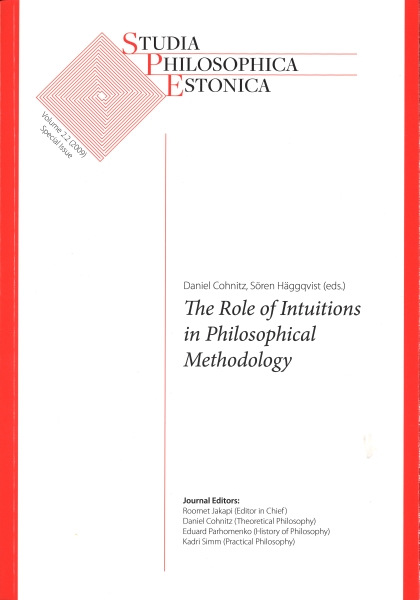Psychology and the Use of Intuitions in Philosophy
DOI:
https://doi.org/10.12697/spe.2009.2.2.09Keywords:
intuitions, psychology, experimental philosophy, conceptual analysisAbstract
There is widespread controversy about the use of intuitions in philosophy. In this paper I will argue that there are legitimate concerns about this use, and that these concerns cannot be fully responded to using the traditional methods of philosophy. We need an understanding of how intuitions are generated and what it is they are based on, and this understanding must be founded on the psychological investigation of the mind. I explore how a psychological understanding of intuitions is likely to impact a range of philosophical projects, from conceptual analysis to the study of (non-conceptual) "things themselves" to experimental philosophy.
References
Ambady, N. and Rosenthal, R. (1992). Thin slices of expressive behavior as predictors of interpersonal consequences: A meta-analysis, Psychological Bulletin 111: 256-274.
Bealer, G. (1993). The incoherence of empiricism, in S. J. Wagner and R. Warner (eds), Naturalism: A critical appraisal, University of Indiana Press, Notre Dame, pp. 163-196.
Bealer, G. (1998). Intuition and the autonomy of philosophy, in M. DePaul and W. Ramsey (eds), Rethinking intuition, Rowman & Littlefield, Lanham, pp. 201-240.
Begg, I., Anas, A. and Farinacci, S. (1992). Dissociation of processes in belief: Source recollection, statement familiarity, and the illusion of truth, Journal of Experimental Psychology: General 121: 446-458.
Betsch, T., Plessner, H., Schwieren, C. and Gutig, R. (2001). I like it but i don’t know why: A value-account approach to implicit attitude formation, Personality and Social Psychology Bulletin 27: 242-253.
BonJour, L. (1998). In defense of pure reason, Cambridge University Press, Cambridge.
Campos, J. J., Hiatt, S., Ramsay, D., Henderson, C. and Svejda, M. (1978). The emergence of fear on the visual cliff, in M. Kewis and L. Rosenblum (eds), The development of affect, Plenum, New York, pp. 149-182.
Carruthers, P. (2006). The case for massively modular models of mind, in R. Stainton (ed.), Contemporary debates in cognitive science, Blackwell, Malden, pp. 3-21.
Cohen, L. (1986). The dialogue of reason, Clarendon Press, Oxford.
Cummins, R.(1998). Reflections on reflective equilibrium, in M. DePaul and W. Ramsey (eds), Rethinking intuition, Rowman & Littlefield, Lanham, pp. 113-128.
Dijksterhuis, A. (2004). Think different: The merits of unconscious thought in preference and decision making, Journal of Personality and Social Psychology 87: 586-598.
Fumerton, R. (1999). A priori philosophy after an aposteriori turn, Midwest Studies in Philosophy 23: 21-33.
Gilbert, D. (1991). How mental systems believe, American Psychologist 46: 107-119.
Gilbert, D. (2002). Inferential correction, in T. Gilovich, D. Griffin and D.Kahneman (eds), Heuristics and biases: The psychology of intuitive judgment, Cambridge University Press, Cambridge, pp. 167-184.
Gilbert, D. and Krull, D. (1988). Seeing less and knowing more: The benefits of perceptual ignorance, Journal of Personality and Social Psychology 54: 193-202.
Gilbert, D., Krull, D. and Malone, P. (1990). Unbelieving the unbelievable: Some problems in the rejection of false information, Journal of Personality and Social Psychology 59: 601-613.
Gilbert, D., Tafarodi, R. and Malone, P. (1993). You can’t not believe everything you read, Journal of Personality and Social Psychology 65: 221-233.
Jackson, F. (1998). From metaphysics to ethics: A defense of conceptual analysis, Oxford University Press, Oxford.
Kornblith, H. (2006). Appeals to intuition and the ambitions of epistemology, in S. Hetherington (ed.), Epistemology futures, Oxford University Press, Oxford, pp. 10-25.
Lewicki, P., Hill, T. and Czyzewska, M. (1992). Nonconscious acquisition of information, American Psychologist 47: 796-801.
Lewicki, P., Hill, T. and Sasaki, I. (1989). Self-perpetuating development of encoding biases, Journal of Experimental Psychology: General 118: 323-337.
Mervis, C. and Rosch, E. (1981). Categorization of natural objects, Annual Review of Psychology 32: 89-115.
Murphy, G. (2002). The big book of concepts, MIT Press, Cambridge.
Nisbett, R., Peng, K., Choi, I. and Norenzayan, A. (2001). Culture and systems of thought: Holistic versus analytic cognition, Psychological Review 108: 291-310.
Norenzayan, A., Smith, E., Kim, B. and Nisbett, R. (2002). Cultural preferences for formal versus intuitive reasoning, Cognitive Science 26:653-684.
Pust, J. (2000). Intuitions as evidence, Routledge, New York.
Ramsey, W. (1998). Prototypes and conceptual analysis, in M. DePaul and W. Ramsey (eds), Rethinking intuition, Rowman & Littlefield, Lanham, pp. 161-178.
Rosch, E. and Mervis, C.(1975). Family resemblances: Studies in the internal structure of categories, Cognitive Psychology 7: 573-605.
Schwartz, N. and Vaughn, L. (2002). The availability heuristic revisited: Ease of recall and content of recall as distinct sources of information, in T. Gilovich, D. Griffin and D. Kahneman (eds), Heuristics and biases: The psychology of intuitive judgment, Cambridge University Press, Cambridge, pp. 103-119.
Sosa, E. (1998). Minimal intuition, in M. DePaul and W. Ramsey (eds), Rethinking intuition, Rowman & Littlefield, Lanham, pp. 257-270.
Sosa, E. (2005). A defense of the use of intuitions in philosophy, in D. Murphy and M. Bishop (eds), Stich and his critics, Blackwell, Oxford, pp. 101-112.
Weinberg, J., Crowley, S., Gonnerman, C., Swain, S. and Vandewalker, I. (2006). Intuition and calibration. manuscript.
Weinberg, J., Nichols, S. and Stich, S. (2001). Normativity and epistemic intuitions, Philosophical Topics 29: 429-460.
Wilson, T. (2002). Strangers to ourselves: Discovering the adaptive unconscious, Belknap Press, Cambridge.
Wilson, T. and Schooler, J. (1991). Thinking too much: Introspection can reduce the quality of preferences and decisions, Journal of Personality and Social Psychology 60: 181-192.





